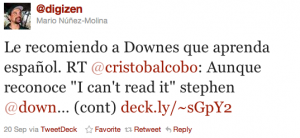Intellectuals of today, especially when coming from the English-speaking world, are not so versed in languages as they were a few decades ago. Some tend to understand only their own English-with few exceptions (for instance, eastern Canadians tend to be bilingual speakers of French). This means that they are not often able to understand, address and incorporate in their research nothing written in other languages. A Latin American or Continental European scholar in the other hand is certainly more “bilingual”, in that they at the very least can appreciate and understand English-language texts, besides their own. The vision of the world given by one-language-only reading is very limited, especially when we consider that our technology allows to close geographic and cultural gaps.
So it happens that English-speaking scholars often exclude from their reading the Spanish-speaking world just because the latter publish their texts in Spanish. I don’t want to implicate that it is done purposefully. But it is done, and with other languages too.
Stephen Downes, whom I deeply admire and read and agree with almost on everything, wrote recently:
I can’t read it, but making a splash in the Spanish speaking world is the release of the eBook Invisible Learning. Here’s the PDF, in Spanish.
[Of the book’s two authors—Cristóbal Cobo & John Moravec—Downes quotes only the latter in his post.]
That is somehow sad, and this is why (I think) I read a reply as direct as this to the issue:
 At first I did not get it. Then @digizen’s reaction struck: He recommended Downes to learn Spanish!
At first I did not get it. Then @digizen’s reaction struck: He recommended Downes to learn Spanish!




